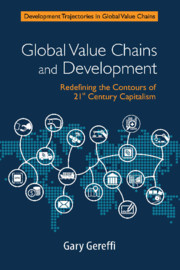Book contents
- Frontmatter
- Dedication
- Contents
- List of Tables
- List of Figures and Boxes
- Foreword
- Acknowledgments
- Sources
- 1 The Emergence of Global Value Chains: Ideas, Institutions, and Research Communities
- Part I Foundations of the Global Value Chain Framework
- Part II Expanding the Governance and Upgrading Dimensions in Global Value Chains
- 5 The Global Economy: Organization, Governance, and Development
- 6 Local Clusters in Global Chains: The Causes and Consequences of Export Dynamism in Torreon's Blue Jeans Industry
- 7 Development Models and Industrial Upgrading in China and Mexico
- 8 Economic and Social Upgrading in Global Production Networks: A New Paradigm for a Changing World
- 9 Regulation and Economic Globalization: Prospects and Limits of Private Governance
- 10 Economic and Social Upgrading in Global Value Chains and Industrial Clusters: Why Governance Matters
- Part III Policy Issues and Challenges
- Co-authors
- Index
7 - Development Models and Industrial Upgrading in China and Mexico
from Part II - Expanding the Governance and Upgrading Dimensions in Global Value Chains
Published online by Cambridge University Press: 09 November 2018
- Frontmatter
- Dedication
- Contents
- List of Tables
- List of Figures and Boxes
- Foreword
- Acknowledgments
- Sources
- 1 The Emergence of Global Value Chains: Ideas, Institutions, and Research Communities
- Part I Foundations of the Global Value Chain Framework
- Part II Expanding the Governance and Upgrading Dimensions in Global Value Chains
- 5 The Global Economy: Organization, Governance, and Development
- 6 Local Clusters in Global Chains: The Causes and Consequences of Export Dynamism in Torreon's Blue Jeans Industry
- 7 Development Models and Industrial Upgrading in China and Mexico
- 8 Economic and Social Upgrading in Global Production Networks: A New Paradigm for a Changing World
- 9 Regulation and Economic Globalization: Prospects and Limits of Private Governance
- 10 Economic and Social Upgrading in Global Value Chains and Industrial Clusters: Why Governance Matters
- Part III Policy Issues and Challenges
- Co-authors
- Index
Summary
Introduction
There are fundamental changes afoot in the global economy, and no simple answers for countries that want to improve or even maintain their levels of development. In recent decades, national and regional development models have come under increasing scrutiny, and countries are trying to determine what kinds of policies and institutions provide the best opportunities for long-term growth and prosperity.
This chapter will explore these issues through a comparative analysis that focuses on how international trade and foreign direct investment (FDI) have shaped the development trajectories of China and Mexico, two of the most dynamic emerging economies in the world. The first section provides a broad comparison of the development models in Latin America and China, with an emphasis on how each has changed in recent decades. The second section uses international trade data to examine industrial upgrading patterns in Mexico and China, with an emphasis on their competitive niches in the US market and why China is taking the lead in a number of different industries. The third and final section looks more closely at a new feature of China's industrial upgrading pattern known as supply chain cities. China's unique model of economic development is fascinating in its own right, but China's escalating importance as a supplier, a market, and recently as a source of outward direct investment makes many countries and regions in the world highly dependent on China's future economic performance.
Comparative Development Models
Since the mid-1980s, globalization has been associated with a neoliberal model of development that has produced rapid economic growth and improving standards of living in some parts of the world, most notably East Asia. In other regions, like Latin America, neoliberalism has been marked by slow economic growth, large-scale unemployment, social deterioration, and political protest. Development models in both Latin America and East Asia, however, have evolved considerably during this period.
Within these regions, China and Mexico present particularly interesting cases because of notable contrasts as well as similarities in their development policies and economic trajectories. Mexico is the most diversified and export-oriented economy in Latin America, with an emphasis on manufactured exports to the United States. China is one of the world's fastest growing economies, with extensive diversification and growing exports to the world. Mexico and China compete head-to-head in many product categories in the US market
Information
- Type
- Chapter
- Information
- Global Value Chains and DevelopmentRedefining the Contours of 21st Century Capitalism, pp. 205 - 227Publisher: Cambridge University PressPrint publication year: 2018
Accessibility standard: Unknown
Why this information is here
This section outlines the accessibility features of this content - including support for screen readers, full keyboard navigation and high-contrast display options. This may not be relevant for you.Accessibility Information
- 1
- Cited by
